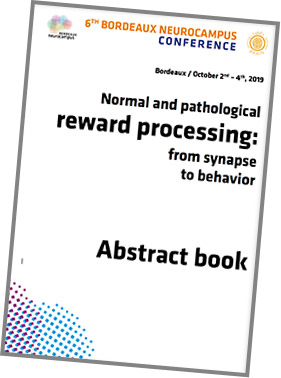Invited speakers' abstracts
Peripheral Sensory Control of Brain Reward Systems
It takes two to reward
A computational model to study the dynamics of representations of rewards in the orbital and medial frontal cortex
CRH PVN neurons decode stress controllability and modify defensive behaviour
The subthalamic nucleus: an unexpected critical node in the reward circuit
Neural mechanisms underlying social motivation
Too much sugar at adolescence: brain reward deficits at adulthood
Neurobiological bases of the rewarding value of exercise
Sex differences in the reward-related effects of opioids in rats
Dopamine neuron activity and the desiderata of learning
Individual Traits and Nicotine Addiction
Reward dysfunction in Parkinson’s disease: trying to disentangle the contributions of neurodegeneration, drugs and individual vulnerability using animal models
The reward circuitry in adolescence is still under construction
Cortico-striatal Glutamatergic Underpinnings of Inflammation-Induced Reward Dysfunction in Depression.
Exploiting individual differences to inform computational models of dopamine in reinforcement learning.
Probing Alcohol Induced Mechanisms of Altered Threat Response
Ventral Striatal D2 Receptors and Motivation
Dopamine Circuits in Reward and Aversion
Model-based predictions for dopamine
Imaging and Treatment Development for Substance Use Disorders
VTA neuronal diversity and motivated behavior
Dopaminergic treatment and excessive behaviours: impulse control disorders in Parkinson disease
Functional and molecular heterogeneity of D2R-expressing neurons along dorsal ventral axis in the striatum
Modulation and functions of dopamine and glutamate receptor heteromers in cocaine-evoked adaptations
Corticolimbic circuitry in reward learning and pursuit
 Download
Download